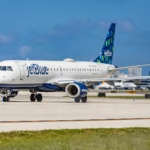Following airspace closures from many countries and the threat of aircraft repossession from foreign lessors, most Russian airlines have suspended their international services. But which airlines are still flying in and out of the embargoed state? Travel Radar investigates.
The story so far
When Russia invaded Ukraine on 24 February, European countries were quick to impose sanctions, with the UK banning Russian aircraft from their airspace the next day, alongside Poland, Czechia, and Bulgaria. Russia responded by banning UK aircraft from her skies and offered similar “tit-for-tat” retaliation to any countries who did the same. Currently, there are 36 countries banned from Russian airspace.
On 27 February, the European Union (EU) announced its package of sanctions against Russia, which revoked EU airspace access and withdrew all aviation services to Russia. This included aircraft leasing and the EU gave lessors 30 days to repossess their airliners. Of the 980 passenger planes in Russia, 777 are leased, and 515 are leased to foreign lessors.
To prevent aircraft mass seizure, the Russian Federal Air Transport Agency (Rosaviatsiya) issued a directive preventing leased Russian planes from leaving the country. Consequently, Russia’s two largest airlines, Aeroflot and S7, announced that they cease international flights. For the Russian airlines who still choose to fly abroad, airspace closures severely limit their options. So what are the options for Russian citizens who want to leave the country?
Air Serbia

Serbia remains one of the few European countries not imposing sanctions on Russia. In fact, Air Serbia has been ramping up the capacity on their Belgrade-Moscow Service, assigning the largest aircraft in their fleet to fly the route daily. The president of Serbia, Aleksandar Vučić, said that it would be impossible for Serbia to sanction Russia, as they had been a guarantor of Serbia’s sovereignty in the 1990s. So it is unlikely that we will see Air Serbia withdraw this service any time soon.
Turkish Airlines

As with Air Serbia, Turkish Airlines has continued its services in and out of Russia, stepping up its services to meet the pent-up demand. It’s currently operating flights to Moscow Vnukovo, St. Petersburg, Kazan, Sochi and Yekaterinburg. Usually, these routes would be flown by an Airbus A320 or Boeing 737, but Turkish have replaced these with Airbus A330s, Boeing 777s and 787s to allow for more passengers. It has also increased the frequency of its flights, increasing from 14 to 18 weekly flights to St. Petersburg and from 3 to 7 weekly flights to Kazan.
Etihad and Emirates

The two United Arab Emirates airlines are still operational, offering flights from St. Petersburg and Moscow to Dubai and Abu Dhabi.
El Al

Israeli carrier El Al currently operates five flights a week between Tel Aviv and Moscow Domodedovo airport. The flights are designed to bring Israelis back to Israel as well as Russian Jews. The Knesset Finance Committee was told that there are tens of thousands of Israelis in the regions and members of the very large Jewish community wishing to come to Israel. However, there hasn’t been universal approval as the airline saw protests on the runway earlier this week from a staff member waving a Ukrainian flag in front of a plane.
Other Airlines
Several other carriers are still flying into Russia, including Qatar, Royal Air Maroc, Pegasus and more. Though usually with only a few flights a week.
Even for airlines permitted to enter Russian Airspace, there are still holdups. In the case of El Al, their insurance would not cover flying into Russia. Consequently, the airline had to get a $2 Billion surety from the Knesset Finance committee in order to continue its flights.
Korean Air cancelled its flights to Seoul-Moscow flights last Friday, as they will no longer be able to refuel their planes in the Russian capital. “We were informed by a Russia-based refuelling service provider this afternoon that we can no longer refuel our planes at the airport in Moscow,” a Korean Air spokesperson told Reuters. It may be that the fuel shortage is a result of the European sanctions or simply that the aviation fuel is needed on the front line.









